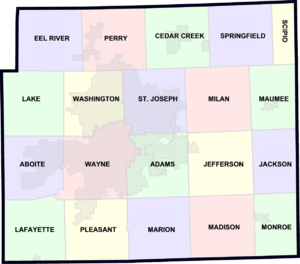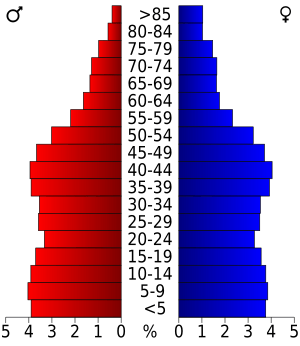Allen County, Indiana facts for kids
Quick facts for kids
Allen County
|
||
|---|---|---|
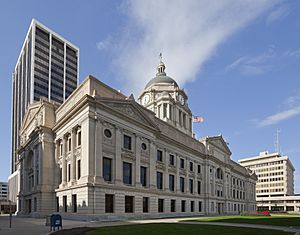
Allen County Courthouse in Fort Wayne
|
||
|
||
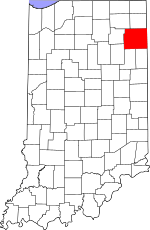
Location within the U.S. state of Indiana
|
||
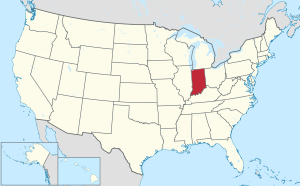 Indiana's location within the U.S. |
||
| Country | ||
| State | ||
| Founded | April 1, 1824 | |
| Named for | John Allen | |
| Seat | Fort Wayne | |
| Largest city | Fort Wayne | |
| Area | ||
| • Total | 660.02 sq mi (1,709.4 km2) | |
| • Land | 657.31 sq mi (1,702.4 km2) | |
| • Water | 2.71 sq mi (7.0 km2) 0.41%% | |
| Population
(2020)
|
||
| • Total | 385,410 | |
| • Estimate
(2023)
|
394,545 |
|
| • Density | 583.937/sq mi (225.459/km2) | |
| Time zone | UTC−5 (Eastern) | |
| • Summer (DST) | UTC−4 (EDT) | |
| Congressional district | 3rd | |
|
||
Allen County is a county located in the state of Indiana in the United States. In 2020, about 385,410 people lived here. This makes it the third-most populated county in Indiana. The biggest city and the main government center is Fort Wayne. Fort Wayne is also the second largest city in all of Indiana.
Allen County is a very important place for culture and business in northeastern Indiana. It is close to many big cities like Chicago, Cincinnati, Detroit, and Indianapolis. This means it's easy to reach a large part of the U.S. population.
People have lived in this area for thousands of years. The county was officially started on April 1, 1824. It is named after Colonel John Allen. He was a lawyer and a state senator from Kentucky who died in the War of 1812. Fort Wayne was chosen as the county seat in May 1824. It was built where the Maumee, St. Joseph, and St. Marys rivers meet.
Contents
Exploring Allen County's Geography
Allen County is the largest county in Indiana by land size. It covers about 660 square miles. Most of this area, about 657 square miles, is land. The rest, about 2.7 square miles, is water.
Neighboring Counties
Allen County shares its borders with several other counties:
- Noble County (to the northwest)
- DeKalb County (to the north)
- Defiance County, Ohio (to the northeast)
- Paulding County, Ohio (to the east)
- Van Wert County, Ohio (to the southeast)
- Adams County (to the south)
- Wells County (to the south)
- Huntington County (to the southwest)
- Whitley County (to the west)
Cities and Towns in Allen County
Allen County has several cities and towns where people live and work.
Cities
Towns
- Grabill
- Huntertown
- Leo-Cedarville
- Monroeville
- Zanesville (partially in Allen County)
Census-Designated Places
These are areas that are like towns but are not officially incorporated as cities or towns.
Unincorporated Communities
These are smaller communities that are not part of any city or town government.
- Aboite
- Academie
- Ari (partial)
- Bluecast
- Boston Corner
- Cedar Canyons
- Cuba
- Dixon (partial)
- Dunfee (partial)
- East Liberty
- Eastland Gardens
- Edgerton
- Ellison
- Ellisville
- Five Points
- Halls Corners
- Hursh
- River Haven
- Royville
- Sunnymede Woods
- Tanglewood
- Tillman
- Timbercrest
- Townley
- Wayne Trace Roundabout
- Yoder
- Zulu
Townships
Townships are smaller divisions of the county, often including rural areas and smaller communities.
- Aboite Township
- Adams Township
- Cedar Creek Township
- Eel River Township
- Jackson Township
- Jefferson Township
- Lafayette Township
- Lake Township
- Madison Township
- Marion Township
- Maumee Township
- Milan Township
- Monroe Township
- Perry Township
- Pleasant Township
- Scipio Township
- Springfield Township
- St. Joseph Township
- Washington Township
- Wayne Township
People of Allen County
| Historical population | |||
|---|---|---|---|
| Census | Pop. | %± | |
| 1830 | 996 | — | |
| 1840 | 5,942 | 496.6% | |
| 1850 | 16,919 | 184.7% | |
| 1860 | 29,328 | 73.3% | |
| 1870 | 43,494 | 48.3% | |
| 1880 | 54,763 | 25.9% | |
| 1890 | 66,689 | 21.8% | |
| 1900 | 77,270 | 15.9% | |
| 1910 | 93,386 | 20.9% | |
| 1920 | 114,303 | 22.4% | |
| 1930 | 146,743 | 28.4% | |
| 1940 | 155,084 | 5.7% | |
| 1950 | 183,722 | 18.5% | |
| 1960 | 232,196 | 26.4% | |
| 1970 | 280,455 | 20.8% | |
| 1980 | 294,335 | 4.9% | |
| 1990 | 300,836 | 2.2% | |
| 2000 | 331,849 | 10.3% | |
| 2010 | 355,329 | 7.1% | |
| 2020 | 385,410 | 8.5% | |
| 2023 (est.) | 394,545 | 11.0% | |
| U.S. Decennial Census 1790-1960 1900-1990 1990-2000 2010-2019 |
|||
In 2010, there were 355,329 people living in Allen County. Most people were white (79.3%), followed by black or African American (11.7%). About 6.5% of the population was of Hispanic or Latino background. Many people in the county have German, Irish, or English family roots.
Fort Wayne is known for having a large population of Burmese refugees. Between 3,000 and 3,500 Burmese people live there.
2020 Census Information
Here's a look at the different groups of people living in Allen County in 2020:
| Race | Number | Percentage |
|---|---|---|
| White (not Hispanic) | 270,149 | 70.1% |
| Black or African American (not Hispanic) | 43,629 | 11.32% |
| Native American (not Hispanic) | 883 | 0.23% |
| Asian (not Hispanic) | 18,191 | 4.72% |
| Pacific Islander (not Hispanic) | 138 | 0.04% |
| Other/Mixed (not Hispanic) | 19,497 | 5.1% |
| Hispanic or Latino | 32,923 | 8.54% |
Amish Community
Since 1852, Allen County has been home to an Old Order Amish community. They speak a special Alsatian dialect, which is rare among Amish groups. As of 2017, about 3,190 Amish people live around Grabill and New Haven.
Historic Allen County Courthouse
The Allen County Courthouse was designed by Brentwood S. Tolan. It was finished in 1902 and cost over $800,000 to build. This was a lot of money back then! The courthouse was built in the Beaux-Arts architecture style. It was one of the most expensive courthouses in Indiana. It even had artwork that cost more than other entire courthouses.
Since 2003, the courthouse has been a National Historic Landmark. This means it's a very important historical building. Today, it is mostly used for government offices.
Allen County's Climate
| Weather chart for Fort Wayne, Indiana | |||||||||||||||||||||||||||||||||||||||||||||||
|---|---|---|---|---|---|---|---|---|---|---|---|---|---|---|---|---|---|---|---|---|---|---|---|---|---|---|---|---|---|---|---|---|---|---|---|---|---|---|---|---|---|---|---|---|---|---|---|
| J | F | M | A | M | J | J | A | S | O | N | D | ||||||||||||||||||||||||||||||||||||
|
2.1
31
16
|
1.9
36
19
|
2.9
47
29
|
3.5
60
38
|
3.8
72
49
|
4
81
59
|
3.6
84
63
|
3.6
82
60
|
2.8
75
53
|
2.6
63
42
|
3
49
33
|
2.8
36
22
|
||||||||||||||||||||||||||||||||||||
| temperatures in °F precipitation totals in inches source: The Weather Channel |
|||||||||||||||||||||||||||||||||||||||||||||||
|
Metric conversion
|
|||||||||||||||||||||||||||||||||||||||||||||||
The weather in Fort Wayne changes with the seasons. In January, the average low temperature is about 16°F (about -9°C). In July, the average high temperature is about 84°F (about 29°C). The coldest temperature ever recorded was -24°F (-31°C) in January 1918. The hottest was 106°F (41°C) in June 1988.
The amount of rain and snow also changes throughout the year. February usually has the least precipitation, while June has the most.
Economy and Jobs in Allen County
In the past, Allen County had many manufacturing jobs. Over time, the economy has changed. Now, it includes different types of businesses. These include defense and security, healthcare, and insurance. Farming is also a very important part of the county's economy.
Many companies have their main offices in Allen County. Some well-known ones are:
- Do it Best
- Franklin Electric
- Indiana Michigan Power
- North American Van Lines
- Steel Dynamics
- Sweetwater Sound
- Vera Bradley
Education in Allen County
Allen County offers many choices for education, from colleges to K-12 schools.
Colleges and Universities
- Purdue Fort Wayne (PFW) is a large public university campus. It has about 14,000 students.
- Ivy Tech Community College has a large campus here.
- Indiana University has a medical education center in Fort Wayne.
There are also several private and specialized schools:
- University of Saint Francis (Indiana) (a Catholic university)
- Concordia Theological Seminary (a Lutheran seminary)
- Indiana Wesleyan University
- Indiana Institute of Technology (IIT)
- Branches of other colleges like Trine University and International Business College.
K-12 Schools
Public schools are managed by four main districts:
- East Allen County Schools
- Fort Wayne Community Schools
- Northwest Allen County Schools
- Southwest Allen County Schools
There are also many private schools. The Roman Catholic Diocese of Fort Wayne-South Bend runs 13 schools. Lutheran schools operate 14 schools. Other private schools include Blackhawk Christian School and Canterbury School. Amish communities also have their own schools for younger students.
Libraries
The Allen County Public Library (ACPL) serves residents with its main branch and thirteen other locations. The main library is very large, covering about 367,000 square feet. It has an art gallery, a bookstore, and a cafe. The library's Fred J. Reynolds Historical Genealogy Department is the largest public genealogy department in the U.S. It has many books and microfilms to help people research their family history.
Parks and Outdoor Fun
Allen County Parks manages four parks where you can enjoy nature and outdoor activities:
- Fox Island (in the southwest part of the county)
- Metea (in the northeast part of the county)
- Payton (in the northern part of the county)
- Cook's Landing (in the northern part of the county)
These parks offer many activities like hiking, swimming, fishing, and sledding. You can also go cross-country skiing in winter. There are playgrounds and picnic areas too. A small fee is usually charged for entry to help maintain the parks.
Getting Around Allen County
Allen County has a good transportation system with major roads, airports, and railroads.
Highways
Many important highways pass through Allen County, making it easy to travel.
 I-69
I-69 I-469
I-469 US 24
US 24 US 27
US 27 US 30
US 30 US 33
US 33 SR 1
SR 1 SR 3
SR 3 SR 14
SR 14 SR 37
SR 37 SR 101
SR 101 SR 205
SR 205 SR 930
SR 930- Airport Expressway
Airports
For air travel, the county has:
- Fort Wayne International Airport
- Smith Field
Railroads
Several railroad lines run through Allen County, used for moving goods.
- Chicago Fort Wayne and Eastern Railroad
- CSX Transportation
- Napoleon, Defiance & Western Railroad
- Norfolk Southern Railway
Images for kids
See also
 In Spanish: Condado de Allen (Indiana) para niños
In Spanish: Condado de Allen (Indiana) para niños



